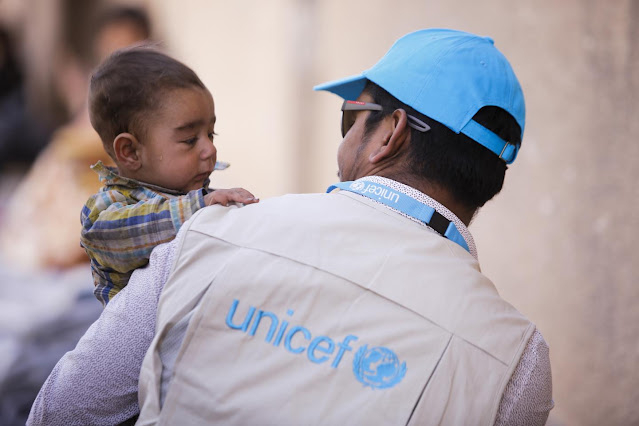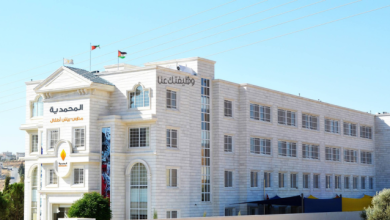مطلوب موظفين للعمل لدى اليونسيف برواتب تصل 1000 دينار

Programme Specialist (P-4), Mental Health and Psychosocial Support (MHPSS), Temporary Appointment, #123261, Amman-Jordan, MENARO (364 days)
Under the supervision of the Child Protection Regional Advisor and the Deputy Regional Director (second reporting officer) the incumbent will provide specialised technical assistance on MHPSS to country offices (CO), the MENA Regional Office (RO), regional organisations, governments, and civil society to advance public policies, programmes and services for girls and boys in development and humanitarian settings. The incumbent will also support integrated, cross-sectoral programming on MHPSS particularly in Child Protection (CP), Education and Health at regional and country levels.
UNICEF works in some of the world’s toughest places, to reach the world’s most disadvantaged children. To save their lives. To defend their rights. To help them fulfill their potential.
Across 190 countries and territories, we work for every child, everywhere, every day, to build a better world for everyone.
And we never give up.
For every child, protection
The fundamental mission of UNICEF is to promote the rights of every child, everywhere, in everything the organization does — in programs, in advocacy and in operations. The equity strategy, emphasizing the most disadvantaged and excluded children and families, translates this commitment to children’s rights into action. For UNICEF, equity means that all children have an opportunity to survive, develop and reach their full potential, without discrimination, bias, or favoritism. To the degree that any child has an unequal chance in life — in its social, political, economic, civic, and cultural dimensions — her or his rights are violated. There is growing evidence that investing in the health, education, and protection of a society’s most disadvantaged citizens — addressing inequity — not only will give all children the opportunity to fulfill their potential but also will lead to sustained growth and stability of countries. This is why the focus on equity is so vital. It accelerates progress towards realizing the human rights of all children, which is the universal mandate of UNICEF, as outlined by the Convention on the Rights of the Child, while also supporting the equitable development of nations.
The MENA region is home close to 508 million people, of which 36 per cent are children under 18. Despite signs of deceleration, with a current natural demographic growth at 1.8 per cent per year, the population is projected to be around 730 million people by 2050, of which 28 per cent will be under 18.
UNICEF supports programmes in 20 countries through 15 country offices in MENA. Despite progress in many social indicators in the last decades, inequalities between and within countries remain substantial. A wide range of country typologies are represented – low, middle, and high income, those at different stages of the demographic transition, complex political-economies, and humanitarian challenges.
Large-scale protracted crises continue to generate significant humanitarian needs in the MENA region, where there are 38 million (one in five) children in need, representing 20 per cent of the children in need globally. The region hosts over six million internally displaced children and 6.3 million refugee children. Countries affected by conflict in the last decade have recorded dramatic regression in their development indicators. The large-scale emergencies are requiring new levels of attention to community engagement for the practice of life saving behaviours, particularly among highly vulnerable and displaced populations. Deeply entrenched gender divides and harmful social practices are affecting progress on programme results in most countries. It is also the region with the highest unemployment rates among young people in the world.
Mental Health and Psychosocial Support (MHPSS) is featured in the UNICEF organizational 2021-2025 Strategic Plan and is integrated within the Theory of Change and Results Frameworks of Goal Area (GA) 1, GA2, and GA3, with a dedicated result area in both GA1 and GA3, with new indicators with Health and Education, and strengthened indicators in Child Protection. Both Child Protection and Health have established outcome indicators. In emergencies, Child Protection, Education, and Health report on MHPSS reach through their respective programming via the Humanitarian Action for Children and other emergency reporting documents. UNICEF’s Core Commitments for Children in Humanitarian Action further stipulates as well that MHPSS is a fundamental multisectoral accountability in MHPSS in emergencies across health, education, and child protection and includes organizational, programmatic, and operational commitments and sector specific benchmarks.
How can you make a difference?
Under the supervision of the Child Protection Regional Advisor and the Deputy Regional Director (second reporting officer) the incumbent will provide specialised technical assistance on MHPSS to country offices (CO), the MENA Regional Office (RO), regional organisations, governments, and civil society to advance public policies, programmes and services for girls and boys in development and humanitarian settings.The incumbent will also support integrated, cross-sectoral programming on MHPSS particularly in Child Protection (CP), Education and Health at regional and country levels.
Summary of key results:
Technical Assistance to Country officesSupport Country Offices in designing and delivering multi-layered, integrated, and cross-sectoral strategies for MHPSS, including co-designing Theories of Change and Results Frameworks.Disseminate latest evidence and guidance on the promotion, prevention, and care in support of mental health and psychosocial wellbeing to UNICEF staff and partners in the region.Develop and deliver capacity building programmes internally and externally with special focus on scalable models informed by evidence that maintain quality and efficacy.Provide technical support to countries towards development, implementation, and evaluation of multi-sectoral country-level workplans in line with the Global MHPSS Multi-sectoral Operational Framework. 2. Resource Mobilisation
In collaboration with the MENARO resource mobilization team, develop a series of proposals (cross-sectoral: CP, Health and Education), briefings and pitches informed by evidence and credible solutions at scale, aimed at resource mobilisation, aligned with UNICEF global guidance.As required, ensure appropriate inclusion of MHPSS approaches and considerations in cross-sectoral proposals.Formulate strategies to leverage public and private resources for mental health and wellbeing programming and services.In collaboration with resource mobilization teams (RO and COs) and HQ, identify potential donors.Engage with donors on briefings and advocating or investing on multi-sectoral MHPSS. 3. Development of Strategic Partnerships and Collaborations
Develop meaningful and effective collaborations with regional institutions, academia or research bodies, professional groups, UN agencies and CSOs with the purpose of establishing systematic policy dialogue, a community of practice, and coordination around MHPSS.Map out key MHPSS stakeholders and influencers across MENA.Develop innovative approaches to deliver MHPSS to children, adolescents, and parents. 4. Generation of Evidence
Prepare briefings on global evidence to inform policy, programming, and resource mobilisation.Develop and implement an evidence generation plan with country offices (Evaluation, Research, Data) to inform UNICEF advocacy and programming. 5. Multi-sectoral coordination
Develop a regional office rolling workplan 2023-2024 with Education, Health and Child Protection sections.Prepare regional multi-sectoral reports and briefings.Coordinate the Regional Office Working Group on MHPSSTo qualify as an advocate for every child you will have…
An advanced university degree in one of the following fields is required: psychology, social work, public health, or related field.A minimum of eight years of Professional experience in MHPSS or related fields.Experience working in a developing country is considered an asset.Relevant experience in programme development in child protection related areas in a UN system agency or organization is considered as an asset.Experience in both development and humanitarian contexts is an added advantage.Fluency in English is required. Knowledge of another official UN language (Arabic, Chinese, French, Russian or Spanish) or a local language is an asset.For every Child, you demonstrate…
UNICEF’s Core Values of Care, Respect, Integrity, Trust and Accountability and Sustainability (CRITAS) underpin everything we do and how we do it. Get acquainted with Our Values Charter: UNICEF Values
UNICEF competencies required for this post are…
(1) Builds and maintains partnerships (2) Demonstrates self-awareness and ethical awareness (3) Drive to achieve results for impact (4) Innovates and embraces change (5) Manages ambiguity and complexity (6) Thinks and acts strategically (7) Works collaboratively with others.
During the recruitment process, we test candidates following the competency framework. Familiarize yourself with our competency framework and its different levels: competency framework here.
UNICEF is here to serve the world’s most disadvantaged children and our global workforce must reflect the diversity of those children. The UNICEF family is committed to include everyone, irrespective of their race/ethnicity, age, disability, gender identity, sexual orientation, religion, nationality, socio-economic background, or any other personal characteristic.We offer a wide range of benefits to our staff, including paid parental leave, breastfeeding breaks and reasonable accommodation for persons with disabilities. UNICEF strongly encourages the use of flexible working arrangements.UNICEF has a zero-tolerance policy on conduct that is incompatible with the aims and objectives of the United Nations and UNICEF, including sexual exploitation and abuse, sexual harassment, abuse of authority and discrimination. UNICEF is committed to promote the protection and safeguarding of all children. All selected candidates will, therefore, undergo rigorous reference and background checks, and will be expected to adhere to these standards and principles. Background checks will include the verification of academic credential(s) and employment history. Selected candidates may be required to provide additional information to conduct a background check.
Remarks:
Only shortlisted candidates will be contacted and advance to the next stage of the selection process.
UNICEF appointments are subject to medical clearance. Issuance of a visa by the host country of the duty station, which will be facilitated by UNICEF, is required for IP positions. Appointments are also subject to inoculation (vaccination) requirements, including against SARS-CoV-2 (Covid). Government employees that are considered for employment with UNICEF are normally required to resign from their government before taking up an assignment with UNICEF. UNICEF reserves the right to withdraw an offer of appointment, without compensation, if a visa or medical clearance is not obtained, or necessary inoculation requirements are not met, within a reasonable period for any reason.
We do our best to provide you the most accurate info, but closing dates may be wrong on our site. Please check on the recruiting organization’s page for the exact info. Candidates are responsible for complying with deadlines and are encouraged to submit applications well ahead.Before applying, please make sure that you have read the requirements for the position and that you qualify.Applications from non-qualifying applicants will most likely be discarded by the recruiting manager.
التقديم المباشر من خلال الرابط:
https://jobs.unicef.org/en-us/job/558157?utm_medium=referral&utm_source=impactpool




